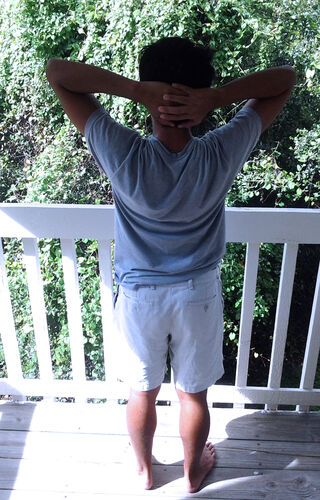Therapy
Peace, Serenity, And Diving In
Experiencing the drama of life may not be contradictory to having peace.
Posted September 30, 2012

In this post I want to expound upon an idea discussed in the post “The Need For Repetition In The Game Of Life”. In that post a theme is how we have to be reminded (or remind ourselves) to step back from being drawn into life, and look at it objectively. It discusses how that is accomplished by returning to either our spiritual beliefs, or our ability to control our perspective. The end of the post purports that to find peace, serenity, and happiness one can step back, objectively view life, and realize the control he or she has. That article discusses how we often get swept back into the drama that is life. But to make life more enriching we return to the reminders that ground us, whether they are religious, spiritual, or psychological.
A book that in a subtle way explores this theme is “The Schopenhauer Cure”, by Irvin Yalom. In the book a therapist who finds he is dying confronts his mortality and seeks to find if his life was meaningful. He begins this by seeking a patient he failed with. This patient found the answer to what he had sought therapy for in Schopenhauer, a nineteenth century German philosopher, who would be called pessimistic at best. Schopenhauer’s philosophy has to do with removing oneself from the fray of life. This is accomplished through isolation, as well as by viewing normal life as a base existence, and striving to educate oneself and rise above it.
In a similar vain in the book, a client in the therapist’s group studies a form of meditation that seeks to remove one from life’s endless up and downs through mediation and an awakening. The client goes to an ashram and is successful at learning the technique. She is able to remove the pain and suffering she sought relief from. Ironically, she ends up denouncing the technique and deciding she’d rather drink in life with all of its pain and joy.
It seems this contrasting view of how to live abounds in religion and philosophy. There is what seems to be contradicting advice: some propose diving in; experiencing what every moment has to offer in its fullest, being completely present. Other philosophical perspectives talk of the illusoriness of life. In that vain life is not to be taken at face value; what is meaningful in life lies behind or beyond what is observed. Buddhism, as well as several psychological perspectives, imply that we generally do not see reality as it is; that our perspective, our experiences, and our conditioning cause us to view reality in a biased fashion.
How is one to reconcile these seemingly opposing beliefs? If one were objective, and viewed life from a detached and objective perspective, wouldn’t he or she be cheating him or her self out of the richness of life’s experience? But if one remains absorbed in the rigmarole of life, how can they find peace and serenity? And what of the disagreements that abound when someone is too caught up in the moment, or the counterpart is too objective?
A complaint amongst some is that their partner is too emotional, too reactive to life. For others the complaint is the opposite; their partner never gets emotional, and because of that it seems like he/she doesn’t care. In these cases there may be a similar dynamic to what is being discussed: Either the individual is reacting out of patterned responses (and thereby not with conscious deliberation); or the individual may be using an objective stance as a defense mechanism (similar to intellectualization). Either stance, alone, would likely be insufficient to a healthy romantic relationship.
Contrary to how it may seem, neither of the philosophical perspectives is exclusory. Conceivably what is needed is a diving in, a completely immersed perception. However, instead of being drawn in, unconsciously, in the normal way of functioning, one engages in life in a conscious way, having made a decision that at this moment he or she will be completely present. In this way one is choosing to immerse in life, rather than being unconsciously sucked into it. Being sucked in results in automatic and programmed responses. Actively engaging, consciously, allows one to fully experience life without feeling at its mercy.
The fictional book “The Schopenhauer Cure” while educating the reader about group therapy (and therapy in general) may also provide a life lesson. Therapists are expected to be able to be completely present with the client, yet have an objective perspective. They are able to empathize with the client, yet not get sucked into the drama. If they do get sucked in, it is the result of countertransference (reacting in an emotional way because the client is triggering feelings once held for another individual). In group therapy, and as Yalom demonstrates in the book, the therapist, and eventually the clients, are able to step back from the content of therapy and observe its process. It is almost as if one has to develop seemingly opposing perspectives: being present and involved, while also observing and being aware of underlying currents and processes. This may be a more fulfilling way to live life.
This would take a great deal of concentration and energy. It is unrealistic to expect anyone living an ordinary life (as opposed to those of monks and clerics) to maintain this type of mindfulness. Feasibly it is human nature simply to have moments of being completely immersed, and others where we are able to remove ourselves and look at life objectively, in a detached yet compassionate fashion. But, with practice and conscious effort, one can master the skill of stepping back when it is most beneficial, and observing the process of life; while at other times being fully involved in it, drinking it in. The goal would be to remain conscious of this ability, and use it to make life more full, yet still obtain peace. Although peace and serenity seem diametrically opposed to being fully caught up in something, it is a matter of balancing the two. Conceivably this balance is a key to happier and more fulfilling existence.
References:
Yalom, Irvin; The Schopenhauer Cure, 2005.
Copyright William Berry, 2012




